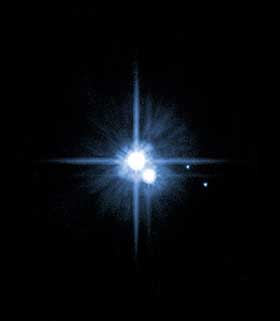
The Hubble Telescope's main camera has shut down and this is creating a problem. Here's an entry from WaPo:
The Advanced Camera for Surveys, a third-generation instrument installed by a space shuttle crew in 2002, went off line Monday, and engineers are still trying to figure out what happened and how to repair it.
"It's still off line today," Max Mutchler, an instruments specialist at the Space Telescope Science Institute in Baltimore, said Saturday.
Engineers are hopeful the problem can be fixed, said Ed Campion, a NASA spokesman at Goddard Space Flight Center outside Baltimore, which is responsible for managing the Hubble.
A bad transistor could be causing the trouble, Campion said. If so, a backup could be used. Another suspicion is that some of the camera's memory was disturbed by a cosmic event. That could be fixed by reloading the memory.
"Both possibilities are things that can be resolved here on the ground," Campion said.
The loss of the camera has not shut down the telescope entirely, he said.
"The Advanced Camera for Surveys is regarded as sort of the workhorse for the telescope, but there are other instruments that are still working," Campion said.

Meanwhile...
Everything Riding On This Shuttle Launch
Observers are saying that everything is riding on this coming shuttle launch.
WASHINGTON (Reuters) - Space shuttle Discovery will carry more than crew and cargo for its scheduled July 1 launch from Cape Canaveral in Florida. The whole shuttle program's future is riding on this flight.Ouch. You just pray that this flight doesn't kill another seven astronauts. WaPo article is more matter of fact:
The stakes could scarcely be higher: if the flight proceeds with a clean, safe lift-off and a trouble-free 13 days, NASA officials have planned two more shuttle flights this year, aiming for the eventual completion of the much-delayed International Space Station and a possible fix for the aging but cherished Hubble Space Telescope.
But if Discovery is seriously damaged at launch and the shuttle crew is sent to shelter aboard the space station, NASA chief Michael Griffin has said he would consider ending the quarter-century-old shuttle program.
In that case, Griffin said on June 17, "I would be moving to shut the program down. ... I think, at that point, we're done."
That would make it virtually impossible to finish building the space station as currently designed or repair the Hubble. It would also leave the United States with no homegrown way to get humans to space until the next generation of vehicles is ready, probably around 2011.
Discovery's commander, Steve Lindsey, said he was encouraged by the forthright design debate since NASA was criticized after the Columbia disaster for squelching dissent.This isn't exactly encouraging to read at all.
"Both sides were listened to, very vocally and very publicly," Lindsey said. "You had a group of engineers who said, 'Change it.' Managers decided, 'Don't change it.' I guess time will tell which side was really right."
Armed with data from each new flight, NASA managers and engineers plan to make changes to the foam on the tank before each future flight until the fleet is grounded in 2010. The next-generation vehicle isn't expected to fly until around 2014.
NASA managers have acknowledged that another fatal mistake could ground the three remaining shuttles before the international space station is finished being built. It also could rule out any chances of a repair mission to the Hubble Space Telescope.
"Look, if we go fly and have another accident, that will be the end of the program," Hale said recently. "I'd rather not fly and say we couldn't get our act together ... than rush into some ill-advised launch where we had a catastrophe."
Nix And Hydra
Pluto's been found to have 2 more moons.

Pluto's two new moons formerly known as S/2005 P 1 and S/2005 P 2, have been named Hydra and Nix by the International Astronomical Union (IAU), the recognized authority for assigning names to celestial bodies. The announcement was made 21 June 2006 in IAU Circular 8723. The two moons were discovered with the NASA/ESA Hubble Space Telescope in 2005.There we go.
Oddbjørn Engvold, General Secretary for the International Astronomical Union, says: "I am very pleased with the decision of the IAU Planetary System Nomenclature Working Group".

No comments:
Post a Comment